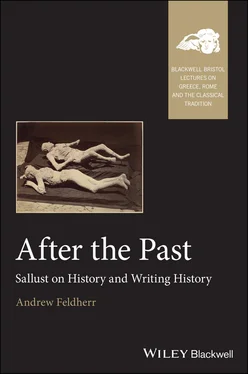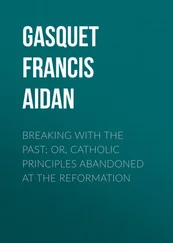My effort at complication begins by challenging what may seem the most obvious path for harmonizing Sallust’s philosophical perspective on events with the expected aims of historiography. If Sallust’s readers could simply recognize true virtus , and if they could actualize their own virtue in a way that made it independent of fama , then ambition and avarice would fall away. A new consensus on what virtue was could provide the basis for a collective evaluation of behavior that makes attention to individual worth not an escape route from history but a new basis for a shared history. 20Yet the quote Seneca preserves from Brutus’ de Virtute about virtutes as present comforts for exiles suggests another alternative. 21The recognition of virtus becomes something readers can take with them as they look in on the res publica from outside, not an exhortation to act but a consolation or validation for those who have not won honores in the traditional way, and perhaps even a spiritual exercise for those who are learning to put virtus ahead of other apparent goods. Whether the “utility” of Sallust’s text will reside in persuading people to act virtuously in the res publica or in accepting their separation from it depends in part upon historical circumstances beyond his control, the political fortunes of the state and his individual readers. But it also depends on the prior generic assumptions those readers will make, themselves doubtless conditioned by their own situations, about whether they are reading philosophy or history. In this way the generic openness of the works becomes dynamic and interacts with a reader’s sense of position in the civic order. Reading in otium can set the stage for a more abstracted, philosophical perspective on the past. Having been witness to events, or connected to those who were, or imagining them in the present, by contrast, draws the reader into an economy of judgment and emulation.
As the final stage of my demonstration of the importance of temporal perspective for making sense of Sallust, I want to show how the opening of the Catiline stages the tension between the timeless truths of philosophy and history’s account of passing time. 22The generic interference of philosophy teaches its audience how to read history in two important ways. First, it continually raises the question of how to view the recent past, with a recognition of the temporal continuities that make the audience’s reading contingent upon the history the text describes, or from the perspective of a philosophical audience, taking their virtues with them as they depart from Rome. Equally important will be the image we form of the nature of Sallust’s own language, for consideration of that key term virtus , where the twin discourses of history and philosophy intersect, makes the reader decide both whether Sallust’s history represents the “real reality” of history, as Aristotle suggests he should, or some more general abiding essence, and, more fundamentally, whether his words can represent anything at all.
To begin, it is important to remember that the question of how to conceptualize time is raised for the reader not just through subtle play with generic conventions, such as the retrospective contrast between claims about omnis homines and history’s focus on the increasingly fragmented parts of this whole; indeed, it is central to the argument of the passage. The distinction between what lasts and what passes away quickly structures the human individual. However, as emerges throughout the work, there are some who nevertheless focus their energies on the brief and fleeting glory of wealth and bodily attributes. There are thus those who look at themselves from the perspective of eternity and those who do not.
But as Sallust defines an audience who perceive human action from the loftier and more lasting perspective afforded by virtus , a new tension develops between the general truths articulated and the increasingly specific voice that articulates them. The differences that unfold from the initial separation of body and soul come to include the distinction between what the text says, which falls on the side of eternity, and the action of saying it. 23Batstone (1990, 120) has aptly described the first sentence’s evocation of absolute moral necessity as “making a fine promise of generalizable truth.” Its oracular authority comes from its seeming to derive from no man, much less an individual. The next sentence however gives special prominence to the possessive adjective, nostra . Such emphasis primarily points the distinction between humans and animals, but it also importantly contributes to our sense of the author behind this statement. He is one of “us”: not the voice of nature, but the voice that names nature. The final stage in the argument makes the particularization of the author even clearer. No longer one of us humans, he is now a “me,” and the conclusions he draws are a matter of opinion not authority. 24This is how things seem to him. But as the authority of the speaker contracts, the magnitude of the claim itself seems only to increase. The argument moves from an account of the bodies of animals, to a description of the divided human vis , to a virtus that is clara and aeterna . 25Not only does the crucial term virtus appear only in this climactic position in the argument, but in context it contrasts strongly with terms based on mere human appraisal. Men are responsible for giving one another glory, but virtus appears a possession, a thing that is held. 26If humans can at best create a memory that lasts as long as possible, virtue escapes those limits by becoming eternal. A sequence of thought that began with a description of downward looking animals has forced us to look up. It represents directly the attributes of a divine being, combining both apprehensibility— virtus is clara —and eternity. In the shift from glory to virtus , therefore, two transitions are made; from a very long time to the eternal, and from a record, reputation, trace, or memory to the thing itself. In the strongest reading of the sentence, eternal virtue stands out like a beacon from the language and the argument that has preceded it, promising an immortality that comes not through historiography’s concern with preserving memory, but from the quality of virtus directly, possessed and held as though it were a thing.
Yet the very verb that seems to produce the epiphany of virtue as a materially apprehensible manifestation of the divine, something that is both eternal and that we can hold, also suggests that the biggest claim made by the sentence is both the most contested and the least authorized. Habetur can refer to the process of judgment— virtus is held or considered such. 27The present tense of “is being held” looks as much like a description of an immediate struggle engaging author and audience now as it does a generalizing description of virtus always and everywhere.
In the sequence that follows, historiography itself becomes quite literally the field of combat for continuing this contest. When Sallust refers to a great “ certamen ,” he seems to gesture towards the traditional form of historiographic opening, which from Thucydides often centered on a war greater than any other war. But Sallust describes a competition to determine not the course of events but rather their interpretation. Its participants struggle not for virtue nor with virtue, but rather about its value:
Sed diu magnum inter mortalis certamen fuit vine corporis an virtute animi res militaris magis procederet. nam et prius quam incipias consulto et, ubi consulueris, mature facto opus est. ita utrumque per se indigens alterum alterius auxilio eget. igitur initio reges — nam in terris nomen imperi id primum fuit — divorsi pars ingenium, alii corpus exercebant. etiam tum vita hominum sine cupiditate agitabatur; sua quoique satis placebant. postea vero quam in Asia Cyrus, in Graecia Lacedaemonii et Athenienses coepere urbis atque nationes subigere, lubidinem dominandi causam belli habere, maxumam gloriam in maxumo imperio putare, tum demum periculo atque negotiis conpertum est in bello plurumum ingenium posse. quod si regum atque imperatorum animi virtus in pace ita ut in bello valeret, aequabilius atque constantius sese res humanae haberent, neque aliud alio ferri neque mutari ac misceri omnia cerneres. nam imperium facile iis artibus retinetur quibus initio partum est; verum ubi pro labore desidia, pro continentia et aequitate lubido atque superbia invasere, fortuna simul cum moribus inmutatur. Ita imperium semper ad optumum quemque a minus bono transfertur . ( Cat . 1.5–2.6)
Читать дальше












